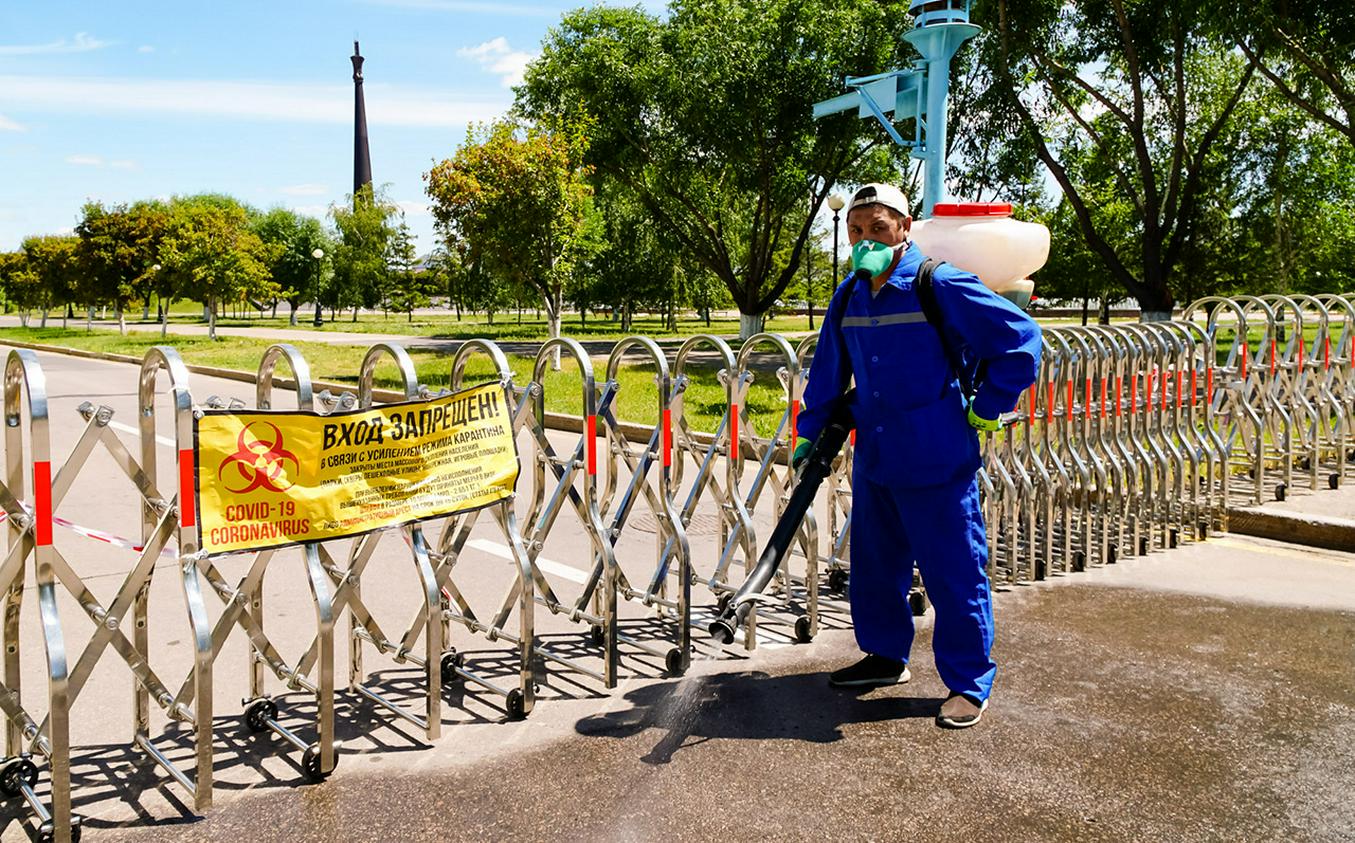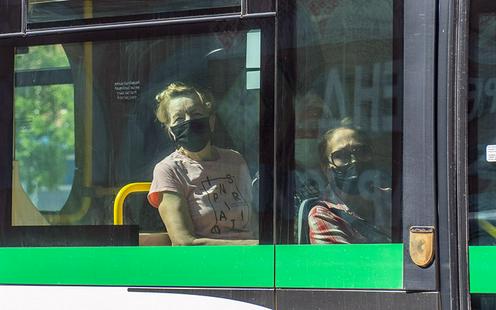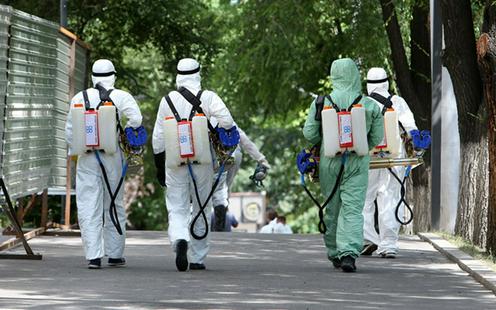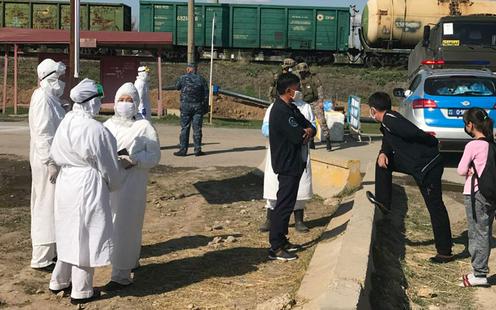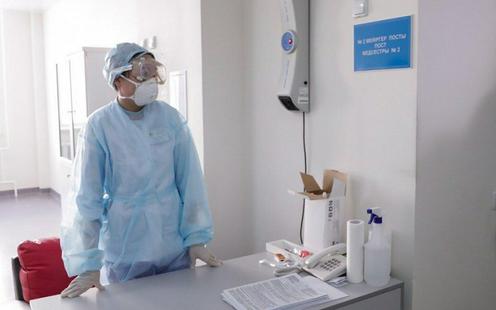The spread of the coronavirus in Kazakhstan has accelerated significantly over the last few weeks. Strict lockdowns are being reimplemented in the country’s regions and hospitals around the country are running out of beds. On 29 June, Kazakh president Qasym-Zhomart Toqaev signalled that a new nationwide lockdown was likely to be imminent. (Kazakhstan has today, 2 July, announced a two-week national lockdown starting on 5 July – ed.) Fergana’s Kazakhstan correspondent sought to find out whether the situation in the country really is spiralling out of control and why there is so much talk these days of the “Italian scenario” repeating itself on Kazakh soil.
What is the situation right now in Kazakhstan?
At the start of the epidemic in Kazakhstan large numbers of infections were detected among people arriving from abroad, and, later, among medical staff fighting the disease. Local outbreaks of the virus then started to occur at major industrial sites. During the state of emergency and accompanying lockdown, the statistics did not look especially threatening, but after lockdown measures were lifted the number of infections around the country began to steadily rise. By the start of June, Kazakhstan was registering an average of 300 to 450 new cases of the coronavirus every day.
At around the same time, the Kazakh health ministry started recording asymptomatic infections separately from its main statistics. At present, asymptomatic infections are increasing at the rate of about 700-1000 per day. Almost 500 asymptomatic infections were detected at the Rakhat confectionary factory alone. (As of 1 July, the Kazakh authorities have gone back to reporting symptomatic and asymptomatic cases together – ed.)
The rising case numbers following the lifting of the lockdown were initially explained as the result of an increase in testing. Later, however, the authorities have instead placed the blame on ordinary Kazakhs walking around in public without face masks and arranging packed private events. Nur-Sultan akim Altay Kulginov, for instance, has repeatedly called on the public to show more caution. The epidemiological situation in the capital has been steadily declining in recent weeks, with the city overtaking Almaty in terms of infection numbers on 24 June.
Among the new cases have been a number of representatives of the Kazakh political elite: First President Nursultan Nazarbaev, present head of state Qasym-Zhomart Toqaev’s press secretary Berik Uali, Mazhilis (lower chamber of parliament) deputy Bekbolat Tleukhan, Senate speaker Nurlan Nigmatulin, and now-former health minister Yelzhan Birtanov. On their heels, a series of highly-placed regional officials, too, began to be infected, including the akims of the Turkestan, Almaty and Kostanay regions. Parliamentary deputy Kairat Kudaybergen, meanwhile, burst into tears while announcing that he had the virus on Telegram.
Commenting on the current spread situation, Kazakh president Qasym-Zhomart Toqaev stated that the lifting of the lockdown had caused Kazakhs to let down their guard. “Some members of the public and some public servants thought that the dangerous phase had already passed and is now behind us. People underestimated the risks and stopped following medical regulations and directives. Some members of the public started to believe rumours that the illness itself did not exist. But COVID-19 remains a serious threat. For this reason the government has once again sharpened lockdown measures,” Toqaev said.
At present (updated on 2 July to following the inclusion of asymptomatic infections – ed.) Kazakhstan has registered 42,574 cases of COVID-19 and 188 deaths.
Nur-Sultan
For the last two weekends in a row, residents of Kazakhstan’s capital city have been banned from leaving their homes unless strictly necessary. Many of those who have already become infected have also been forced to remain at home ill. Astana resident Gulnaz told Fergana’s correspondent that she had gone to take a coronavirus test as soon as she started to cough and sneeze.
“I took the test on Friday, after standing in a busy queue. We waited under the heat of sun for around two hours, then I had to wait for the results. It turns out that now you have to wait for four days. At 7 pm on Saturday evening I got an answer – the test was positive. There were no instructions (about what to do next) at all. I phoned the ambulance services. I thought they would come and collect me like in the movies (she laughs). They called me back and said they were not coming – they had a lot of callouts for more serious cases. I called 109. The doctor told me that it’s better not to go to hospital – there they have very sick patients. I had typical cold symptoms, but I also lost my sense of taste. I told them about these symptoms and they just gave me a standard prescription for flu and respiratory illnesses: Arbidol (an antiviral agent), ten Revit tablets a day or vitamin C 500, Nimesil twice a day, wash my nose out with a saline solution, use a nasal spray and drink plenty of liquids – like tea with lemon,” Gulnaz says.
According to her, prices for a number of medications in pharmacies have quickly shot up, and the paracetamol and thermometers recommended by doctors have already sold out.
Gulnaz also says that she did not get the impression that medical staff were especially interested in how she was feeling. “Two days later my local doctor called me from the polyclinic to check on my condition. Three days after this he told me by video call that there was no need for a CT scan. Two calls from my local doctor in a week. That’s it. He also explained to me that this was because of the very high number of patients. Now I’m hearing from some of my friends that there are no test kits left. The emergency services still don’t come and collect people. They’re not even admitting people to hospital. I’m lucky that I took a test when I did,” she says.
The worsening epidemiological situation led to the Nur-Sultan authorities deciding to close all kindergartens and temporarily suspend regular appointments at the city’s polyclinics.
Residents, however, say that even before this, polyclinics and the emergency services had been failing to respond to those calling in for help. A huge number of complaints have appeared on social media in relation to this. Here we will cite just a few of them.
“The medical services in Astana are a total mess!! Physicians won’t answer calls, receptionists don’t even pick up the phone! Where are the widely-proclaimed online consultations?? What is being written by our officials corresponds with reality about 0.001%!! Even the much-vaunted UDP call centre has been disconnected! What should I do? How can I get treatment? Can anyone say where else and who else I can call??? Don’t call 1430 (the medical call centre) – they don’t provide consultations and don’t know what they are talking about!! The ambulance services came and advised me to contact my local doctors and so on round and round in circles for two days!! In my opinion, responsibility for the deaths of those who are dying right now rest on the consciences of the unscrupulous people working at the health ministry and the akimat, and doctors who are too busy playing football,” writes Olga Pak.
“My neighbour’s father was diagnosed with blood cancer in the spring. Since then they have been through hell, they’ve sold everything they own. Now they’ve been hit by a new blow – they’ve been refused hospitalisation for a second course of chemotherapy due to the coronavirus and the suspension of all regular hospitalisations,” Azhar Sayat relates.
Meanwhile, the numbers of COVID-19 patients in the capital’s hospitals continues to grow, and they are running out of both beds and doctors. “It’s a complete nightmare here. The hospital is overfull and there are a huge number of patients. The intensive care unit at our hospital has 6 beds. And we have 25 patients. Now they’re being put in the operation theatre, which has become an intensive care unit. The burden on doctors has increased – two doctors for 25 people. Things are heading for just like it was in Italy, when they ran out of ventilators. That’s it, sorry, I can’t speak anymore, I have to work,” Gabit Nurkhanuli, a doctor at one of the capital’s hospitals, told Fergana’s correspondent.
Almaty
The picture is no better in the country’s largest city, Almaty. By mid-June, according to data from the municipal health authorities, the number of patients with a severe form of COVID-19 had significantly increased. This fact was confirmed for us by doctors at the city’s infectious diseases hospitals.
“After the lockdown was eased, people went out onto the streets and not everyone followed the sanitary regulations. At first it was quiet, because the incubation period can be two weeks. From the beginning of June we started to admit patients by the dozens. Whereas at the start of the epidemic we had 20-25 people coming in – with mild symptoms – now there are many more patients, and almost all of them have a severe form of the illness. Compared to the start of the epidemic, the need for ventilators this month has probably increased by about 20 times. In our hospital we only started to use the devices at the start of June. Up to then we got by with normal oxygen masks, but we do have enough machines here,” said the head of Almaty’s Pulmonary Tuberculosis Centre, Abzal Malbaskanov.
According to him, the large number of seriously ill patients is behind changes in the procedures for hospitalisation: hospitals now only admit people with severe symptoms, so that beds that are already in short supply are not occupied by patients with mild or asymptomatic forms of the disease.
The doctor is sure that the turning point in the deteriorating situation in Almaty was the period of time from the end of the lockdown on 11 May until the start of June. “Unfortunately, some people still don’t believe (in the existence of COVID-19), but if the public rally together then we will defeat the virus. We want to come out of this situation with the lowest number of losses possible, and at the end of the day, we too want to go home (medical staff in Kazakhstan and elsewhere in Central Asia are quarantined along with patients, generally serving for at least a month at a time, plus a two-week post-service quarantine ed.). I personally have not been home since 18 March and I have my wife and three kids waiting for me. I’m worried because if they get ill, how am I going to be able to help them? Last week two of the nurses lost their mothers. And they were unable to go to the funerals so as not to place other people at risk. They cried, but quietly carried on with their work. Right now the situation is almost like it was in Italy, there really aren’t enough medical workers, it’s very sad. There are never enough staff, some of our employees have been moved to newly set up hospitals due to the shortage of medical workers. They’re being gathered into teams in order to cover as large a part of the population as possible. We don’t want to have the kind of tragic situation like there was in Europe. But it’s worrying that there are more patients now with an advanced form of the disease,” the doctor said.
As in the capital, infectious diseases hospitals in Almaty have filled up rapidly and people with coronavirus symptoms have started to be turned away. Commenting on reports of ambulance services turning down patients with COVID-19, the head of the municipal public health department, Kamalzhan Nadyrov, said that the situation in the city was “indeed difficult” and that the healthcare system’s resources were “not unlimited”. “It’s not just a question of available beds, but also of teams of doctors who can work with COVID patients. Because of this, unfortunately, we are forced to hospitalise only those patients who have a moderately severe and severe form of the illness,” Nadyrov stated.
Ultimately, the Almaty authorities turned to the idea of converting the city’s sports stadiums into hospitals for COVID-19 patients. If the situation continues to worsen, the municipal administration intends to set up an additional 300 beds at the Halyk Arena and the Almaty Arena (Translator’s note: Since this article was originally published, it has been confirmed that the Halyk Arena will be used as a temporary hospital from 1 July). In total, Nadyrov says, this will bring capacity to 3,700 infectious diseases beds.
Speaking about the current situation in Almaty, paediatric neurologist Kairgali Koneev says that with the opening of new temporary hospitals, the deficit of doctors will become even more acute. “The new clinics won’t make much difference as there will be no one to work in them, there already aren’t enough doctors. And we mustn’t forget that, as well as COVID, there are many other illnesses that require immediate treatment,” Koneev points out.
As in Nur-Sultan, complaints by Almaty residents on social media are numerous. “Our friend broke his collarbone, but in order to perform an operation they demand a (coronavirus) test and a CT scan. Otherwise they won’t do it. There are queues everywhere. If only they could separate out those for whom it is an emergency. Our friend feels fine and has no symptoms, and the operation is urgent. I don’t understand why they don’t give him an emergency test,” writes Alma Musina in a comment to a post on Facebook.
“How am I going to be able to give birth? It remains impossible to get a COVID test. Today I went to my local polyclinic to take a PCR test for the coronavirus, like I was told to do by the nurse. She promised that they would let me skip the queue. When I turned up there were only 3 people there and I was overjoyed, but then the lab called and said that there would be no tests until 29/06. Earlier they had said 23/6. I should mention that our clinic only has a contract with this one laboratory. So what now? On 30 June I’m scheduled for a caesarean,” Larisa Alzokina writes.
For over a week now, huge queues have been forming outside of PCR-testing laboratories. Some people arrive even before opening time, but even this does not guarantee being able to get tested the same day. Nor does it guarantee a speedy result. Almaty’s Department for Quality Control and Safety of Goods and Services says that coronavirus test results are returned within 5 days. But many of those fortunate enough to make it through the hours of queueing and actually take a test are then left waiting for almost a week or even longer.
Whereas the authorities earlier announced that the number of laboratories in the city had been increased to seven, it now seems that some of them have had to suspend testing due to a shortage of reagents. The clinic Medical Partners Korea, for instance, complained about problems in obtaining deliveries of reagents from South Korea – flights are few and even scheduled flights are sometimes cancelled for unknown reasons.
On top of all this, the Almaty authorities have suspended regular appointments and examinations and ordinary prophylactic work in all of the city’s hospitals. As in Nur-Sultan, thermometers and pyrometers used to measure the temperature of customers entering cafés, shops and supermarkets have all sold out. It has also become difficult to get hold of paracetamol, aspirin and Arbidol – despite the fact that the Department for Quality Control and Safety of Goods and Services stated last week that warehouses and pharmacies have all necessary medication in stock.
Aktobe and Shymkent are suffocating from pneumonia
In a number of regions around the country, large numbers of patients are being diagnosed with pneumonia while returning negative test results for COVID-19. Such a situation is being seen in particular in the Aktobe region, where hospitals have already run out of beds. The regional also has a shortage of doctors. According to the regional health department, since the start of June the number of pneumonia patients has increased by six times. Between 1 and 18 June, 650 people have been diagnosed with the illness, and the number of new patients increases for every day.
As the situation has deteriorated, the health department has converted three other hospitals into pulmonological wards and raised the total number of beds to 446. In the city of Aktobe itself, a 400-bed pulmonological ward is being opened in the regional tuberculosis hospital.
Meanwhile, in an interview with Diapazon, First Moscow State Medical University infectious diseases specialist Karina Umbetova asserted that “the pneumonia in Aktobe really is the coronavirus”.
“In Aktobe, people think they have some kind of mysterious “Aktobe pneumonia” because COVID is not being detected. This is not the case. By the time you have pneumonia, the coronavirus is not going to be detected, it’s no longer in the oropharynx, but in the lungs, and blood tests are not very helpful in such cases. At our hospital we diagnose according to the full clinical picture, and Aktobe’s pneumonia patients have this very picture,” Umbetova said.
The number of pneumonia patients is growing in Shymkent too. Temporary hospitals there are almost 100% full. Doctors speaking to Fergana on condition of anonymity agree that here too it is a case of coronavirus infections that are not being picked up by PCR tests and rapid diagnostics testing.
Since the start of June, 360 people in the city have been diagnosed with pneumonia. On 25 June, it was announced that 24 people had died in the last 4 days.
A local resident by the name of Jannat told Fergana’s correspondent that, one week after “catching a cold”, her mother started to have trouble breathing. “First of all they didn’t want to take her in to hospital, they said that she was a mild case. Then we called the emergency services again when she was already severely ill. They gave her some oxygen and she started feeling better. At 3 in the morning, I secretly sneaked into the ward and saw my mum in a coma without her oxygen mask on, without anything. I got down on my knees, crying, praying for them to put her on a ventilator. Within an hour she was alert again. There was another woman there. No one was taking care of her. I gave her a glass of water. This morning I found out that she had died, even though she appeared to be better off than my mum. Mum’s now on a ventilator, but they are threatening to take her off of it since there aren’t enough to go around,” Jannat recounted.
The following day she wrote that her mother had died.
Elsewhere in Kazakhstan
Almost every day there are stories on social media of some or other tragic case related to COVID-19 or pneumonia. Since the start of June, various cities around the country have been reimplementing restrictions. For instance, a strict lockdown was reintroduced in the Karaganda region, following the detection of 77 new infections in one day. Checkpoints were set up on roads into Zhezkazgan, the village Zharyk in the Shet district and in the Qarqaraly district. The operation of public transport, taxis, shopping centres, markets and state agencies was also restricted. People were banned from using their vehicles at night, and people over 65 were advised to steer clear of public places.
The virus has also been raging in the Pavlodar region. On the weekend of 20-21 June, shopping and entertainment centres, chain stores and markets were shut in Pavlodar and Ekibastuz, along with beauty salons, hairdressers, car washes and car repair garages. Parks, squares, embankments and beaches were also closed to the public.
Lockdown measures were strengthened in the North Kazakhstan, East Kazakhstan, Mangystau, Atyrau, West Kazakhstan, Turkestan and Almaty regions. Checkpoints were set up on roads out of Kokshetau and Stepnogorsk in the Akmola region. Residents were banned from going out after 10 pm.
Over the weekend of 28-28 June, a lockdown was declared in five cities in the Kostanay region: Kostanay, Rudny, Zhitikara, Arqalyq and Tobyl.
What next?
The situation with the coronavirus in Kazakhstan has slipped totally out of the health ministry’s control, doctor Kairgali Koneev is convinced. “Health ministry employees are now working from home and ordinary doctors are making their own decisions. There is no coordination or clear management,” the medic says.
Koneev does not agree with the authorities’ claims that the public are to blame for the worsening epidemiological situation. “They shouldn’t be blaming the public. If they had localised the infection right from the start of the state of emergency then everything would have been much easier. This wasn’t done. Where are the fruits of the health ministry’s information campaign, if there even was one? The president ordered health minister Birtanov (who resigned on 25 June after being hospitalised with COVID-19 – ed.) to organise the distribution of face masks in supermarkets free of charge. What happened to this? You can’t even always buy masks in pharmacies, deliveries of course sometimes get delayed. So ultimately there are no masks or medication, and not enough tests, and the blame gets put on the public,” the medic says.
Koneev feels that a return to a strict lockdown would be ineffective. “Now that the situation has already gotten out of control and the coronavirus, it seems to me, has penetrated into almost every family, a lockdown won’t give the desired effect, it will just harm the economy. We need a smart lockdown, we need to precisely quarantine groups in which outbreaks appear. To do this we need reliable and fast diagnostics. But our sanitary services are working blind, they can’t move in the right direction due to a lack of test kits. We need to do a huge antibody survey of the population like they did in the Czech Republic back in April. We need to do tests in every city district and see where a high level of antibodies means a herd immunity is being built up. And in places where the antibody level is low, we need to put anti-epidemiological measures in place in order to stop the spread of the infection,” the doctor suggests.
But, he continues, there is no way right now to proceed with mass testing since the opportunity for stocking up on test kits has been missed. “We see now that there are simply not enough test kits for diagnostics, there are not enough beds. It turns out that some private firms have been permitted to test for the virus and others not – which looks a lot like lobbying to me. The small number of laboratories has led to huge queues and an increased risk of infection. People who are trying to get tested are infecting one another, there’s no kind of organisation. All this has led to the collapse of the health system. And there is currently no end in sight,” Koneev concludes.
Bagdat Asylbek
Translated and adapted by Nick L.
-
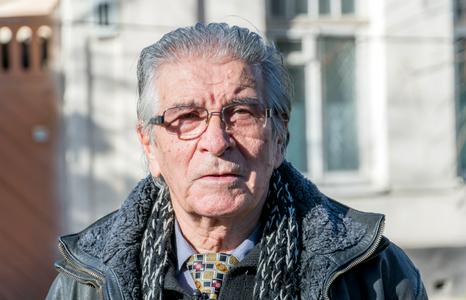 05 February05.02The “Guardian” of Old Tashkent Has Passed AwayRenowned local historian and popularizer of Uzbekistan’s history Boris Anatolyevich Golender dies
05 February05.02The “Guardian” of Old Tashkent Has Passed AwayRenowned local historian and popularizer of Uzbekistan’s history Boris Anatolyevich Golender dies -
 23 December23.12PhotoTokyo DriveJapan to invest about $20 billion in projects across Central Asia over five years
23 December23.12PhotoTokyo DriveJapan to invest about $20 billion in projects across Central Asia over five years -
 17 December17.12Sake for SixCentral Asia’s Rapprochement with Japan Comes with Hidden Pitfalls
17 December17.12Sake for SixCentral Asia’s Rapprochement with Japan Comes with Hidden Pitfalls -
 24 November24.11Here’s a New TurnRussian Scientists Revive the Plan to Irrigate Central Asia Using Siberian Rivers
24 November24.11Here’s a New TurnRussian Scientists Revive the Plan to Irrigate Central Asia Using Siberian Rivers -
 11 November11.11To Live Despite All HardshipUzbek filmmaker Rashid Malikov on his new film, a medieval threat, and the wages of filmmakers
11 November11.11To Live Despite All HardshipUzbek filmmaker Rashid Malikov on his new film, a medieval threat, and the wages of filmmakers -
 22 October22.10Older Than the Eternal CityWhat has Samarkand accomplished in its three thousand years of existence?
22 October22.10Older Than the Eternal CityWhat has Samarkand accomplished in its three thousand years of existence?
